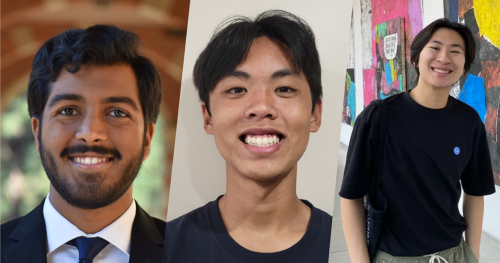3 UCLA undergraduates receive Goldwater Scholarships
By Kayla McCormack
Three Bruins are among the latest class of Goldwater Scholar recipients. Just 438 students were selected for the prestigious award, out of more than 5,000 applicants.
The national scholarship is awarded to sophomores and juniors who plan to pursue research careers in mathematics, engineering or natural sciences. The Goldwater Scholarship awards up to $7,500 per academic year to help cover the cost of tuition and other educational expenses.
This year’s recipients are Sohan Talluri, a third-year microbiology, immunology and molecular genetics major; Tim Duong, a third-year chemistry major and math minor; and Ethan Hung, a third-year computational and systems biology major. Learn more about them below.
Sohan Talluri
Major: microbiology, immunology and molecular genetics
Academic goal: M.D./Ph.D. in immuno-oncology
Research goals: Conduct translational research into developing more effective cancer and allergy immunotherapies as a professor at a major academic hospital.
What sparked your initial interest in your field?
Growing up with food allergies, asthma and eczema, it was clear to me that the world needed more effective therapies for these incurable immune disorders. Connecting with others who also struggled with my conditions, I realized that I personally wanted to develop treatments and potentially cures for these diseases, sparking my interest in pursuing immunology.
How have your experiences conducting undergraduate research at UCLA influenced your academic and career aspirations?
Conducting research at UCLA introduced me to the broad therapeutic applications of immunology, ranging from allergies to cancer. I’ve had the unique opportunity to contribute to multiple translational and clinical immunotherapy projects in my labs, all of which have cemented my passion to continue developing more effective cancer and allergy treatments in the future.
What aspects of your research interests do you find most captivating?
With my cancer research in particular, witnessing the engineered immune cells attack and destroy cancer cells in real time has been extraordinary. The knowledge that my work is actively contributing to therapies that will help patients live better lives brings me back into the lab each day.
Tim Duong
Major: chemistry
Academic goal: Ph.D. in theoretical and computational chemistry
Research goals: Conduct research in the method development of electronic structure theory and quantum dynamics and teach at the university level.
What sparked your initial interest in your field?
My initial interest in pursuing theoretical and computational chemistry was sparked by the sitcom “The Big Bang Theory.” I was especially inspired by one of the main characters, Sheldon Cooper, who studied theoretical physics at Caltech.
How have your experiences conducting undergraduate research at UCLA have influenced your academic and career aspirations?
My research experiences here at UCLA have given me a better sense of graduate studies and the possible career paths in theoretical and computational chemistry.
What aspects of your research interests do you find most captivating?
The most captivating part of my research is the study of the quantum world. Although I knew nothing of it before entering UCLA, I had always thought that quantum mechanics were something that could be cool to pursue. As a result, this interest and being able to pursue it within the field of chemistry drove my passion for my chosen field.
Ethan Hung
Major: computational and systems biology
Academic goal: M.D./Ph.D. in immunology and quantitative medicine.
Research goals: Apply my skillset in computational and basic research to accelerate novel treatments and address unmet medical needs as a physician-scientist.
What sparked your initial interest in your field?
My experiences in Professor Aaron Meyer’s lab starting my first year exposed me to computational research for the first time, and it’s allowed me to really appreciate quantitative, data-driven biology. Paired with later research experiences, my current goal is to pursue an M.D./Ph.D. with a hybrid of wet and dry lab, focusing on immunology.
How have your experiences conducting undergraduate research at UCLA have influenced your academic and career aspirations?
Conducting research in the Meyer Lab for the past three years has been instrumental in developing fundamental technical and scientific communication skills. Whether it’s taking on a level of ownership in research projects or reapplying knowledge from lab meetings in new settings, most of what I’ve done in my undergrad stems from the skills and opportunities afforded by working with my principal investigator, Professor Aaron Meyer, and my grad student mentor, Cyrillus Tan.
What aspects of your research interests do you find most captivating? How do they drive your passion for your chosen field?
I really like the idea of taking a biological problem and tackling it quantitatively, and that’s what led me to apply as a computational and systems biology major at UCLA in the first place. Getting into research and seeing the incredible potential of computational approaches in all types of translational research is what excites me about the field the most. Most of my work in the Meyer Lab has focused on tensor decompositions, drawing biologically significant insights from molecular measurements structured as multimodal datasets in breast, lung and ovarian cancer as well as infectious diseases like HIV and COVID-19, ultimately contributing to personalized medicine in the clinic.
Having a strong quantitative background has also allowed me to work on exciting projects like using tensor methods to characterize patients with Alzheimer’s via electronic medical records in Professor Tony Capra’s lab as well as exploring biochemical and proteomic changes that occur in cancer cells in Professor Scott Lowe’s lab, with applications toward small molecule drug discovery. It’s these types of problems that I’m stoked to continue helping solve in the future.
For further information on the Goldwater Scholarship, contact the Center for Scholarships & Scholar Enrichment.
Click here to add your own text




 Courtesy of Diego Sarmiento
Courtesy of Diego Sarmiento